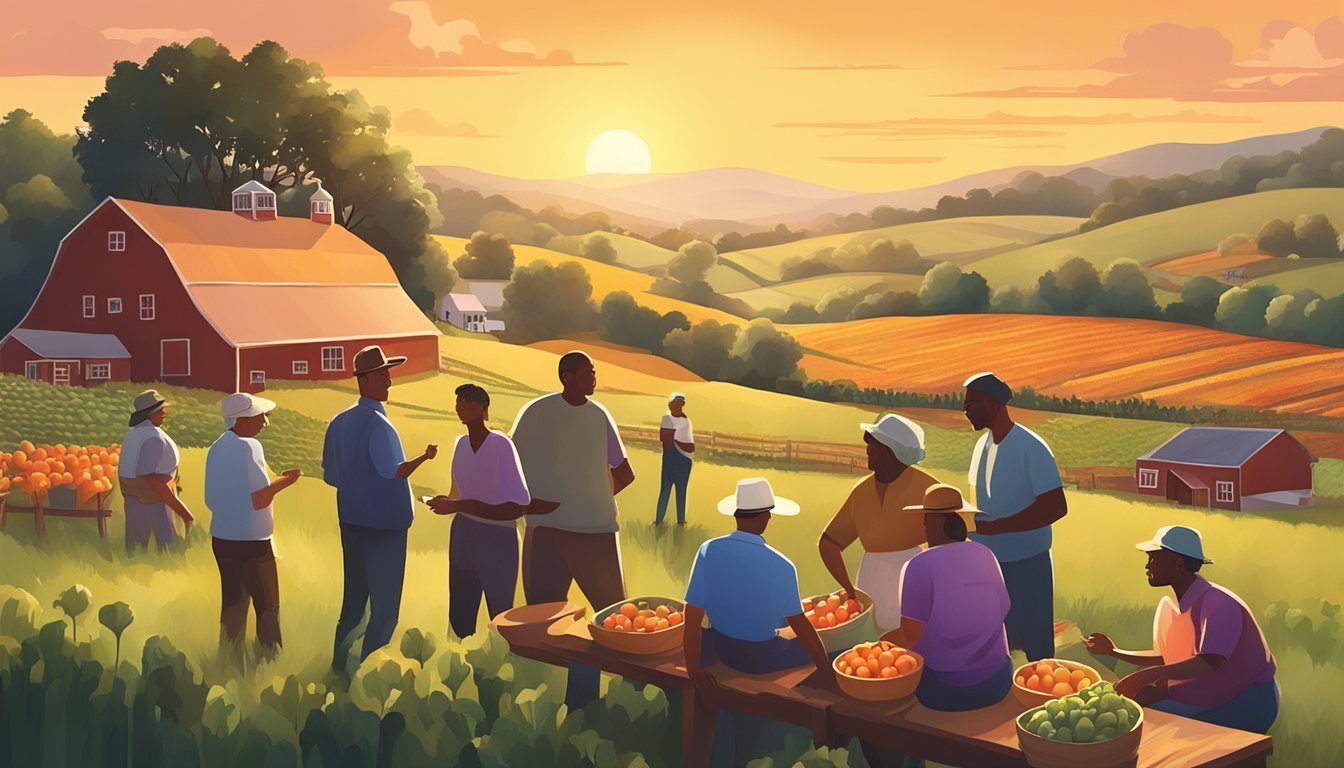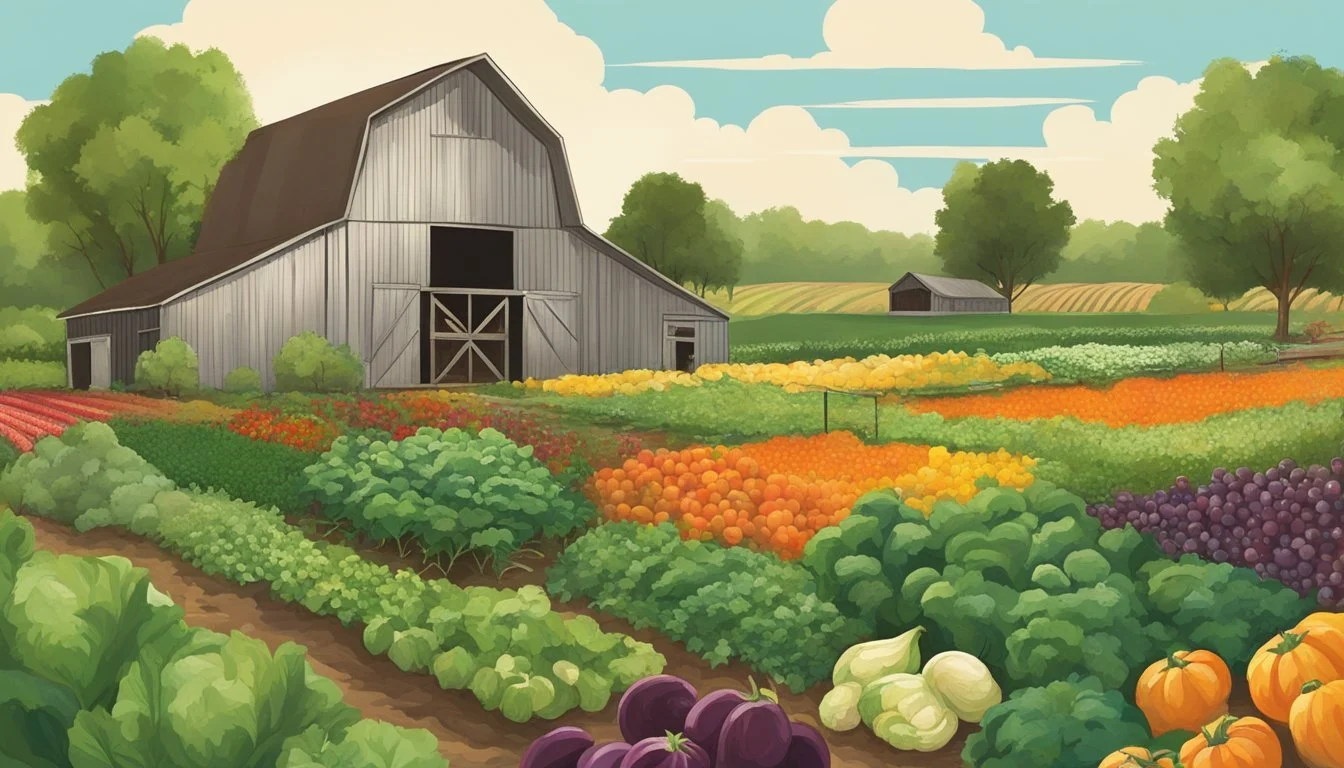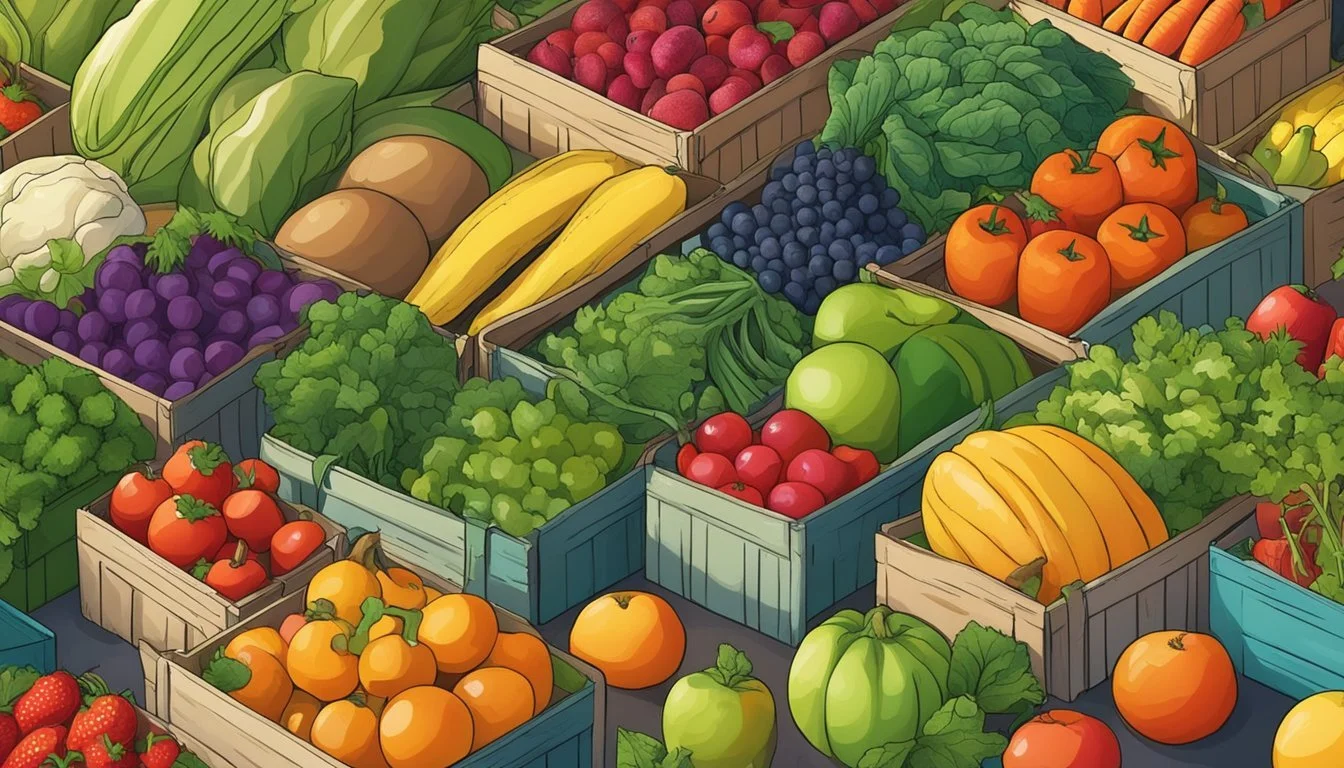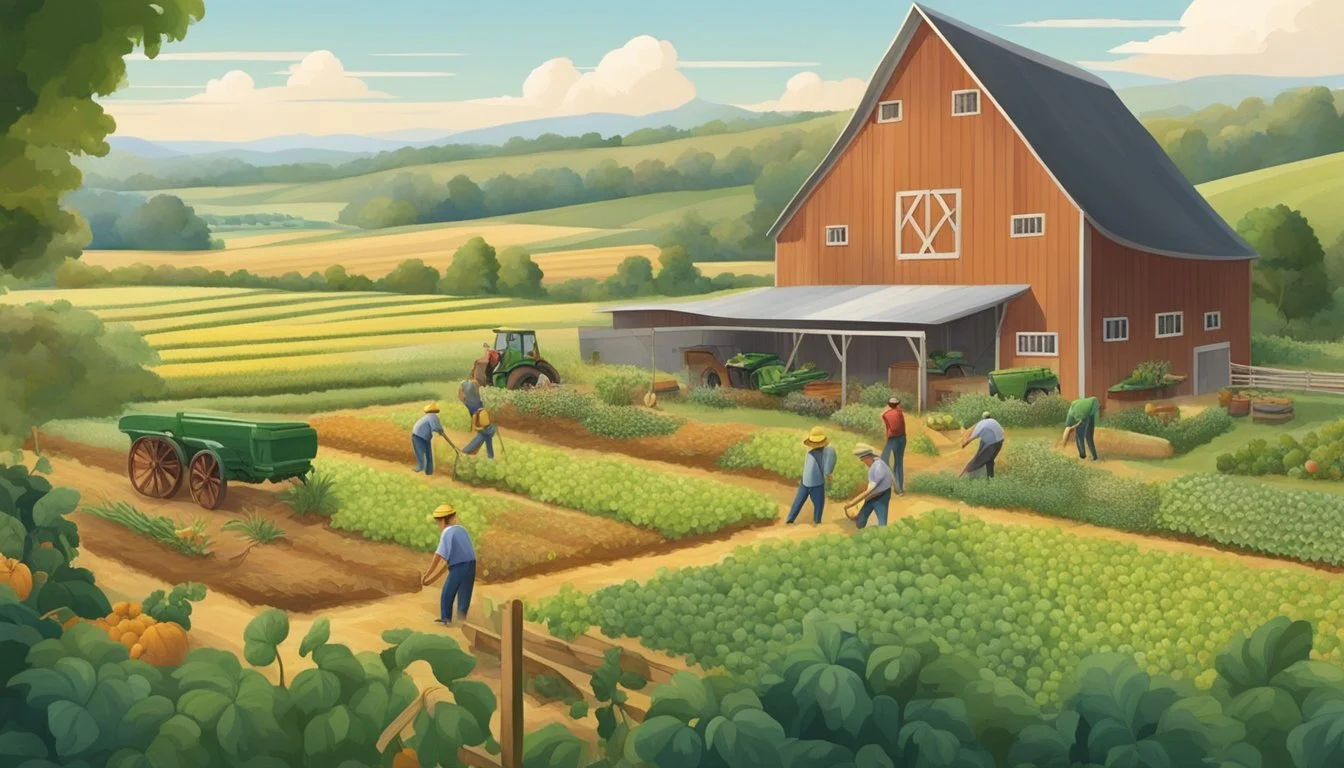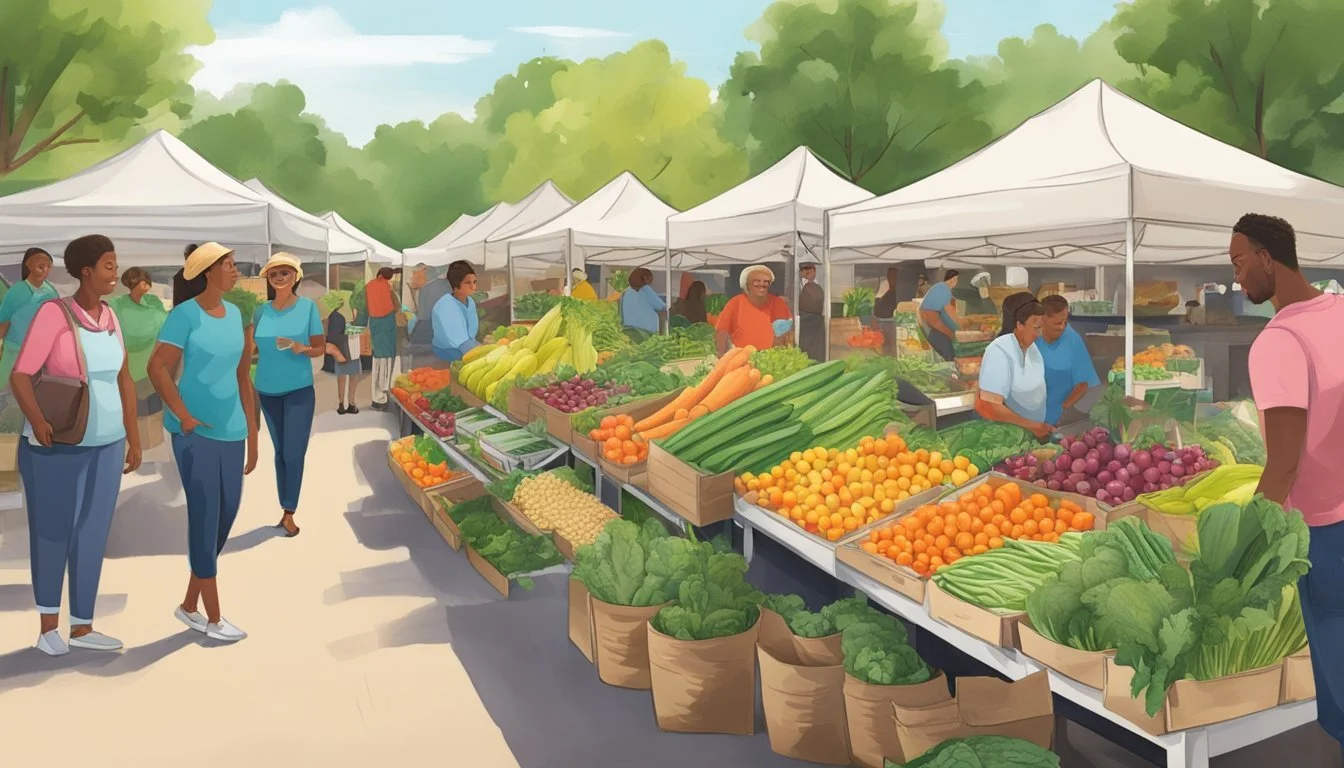Community Supported Agriculture (CSA) in Denton, TX
A Guide to Local Farm Partnerships
Community Supported Agriculture, commonly known as CSA, has taken root in Denton, Texas, as a sustainable food sourcing model that mutually benefits local farmers and consumers. CSA members buy shares in a farm’s production ahead of the growing season and in return, receive a portion of the farm’s harvest. This upfront investment allows farmers to plan their crop rotations and fund operations while providing members with fresh, locally grown produce.
In Denton, CSA programs underscore the city's commitment to local farming and provide a direct connection between residents and their food sources. Farms like Earthwise Gardens and localized operations such as Little Foot Farm have become integral parts of the community. They offer not only vegetables but often other farm products like fresh eggs, meats, and handcrafted goods, fostering a deeper appreciation for agricultural practices.
The impact of Community Supported Agriculture in Denton extends beyond individual households. It influences local economies, supports environmental sustainability, and promotes a sense of community by encouraging farm-to-table networks. This model of agriculture not only delivers high-quality foodstuffs to local Texans but also sows the seeds of a more resilient food system within Denton County.
Overview of CSA
In Denton, TX, Community Supported Agriculture (CSA) connects residents with fresh, local produce while supporting sustainable farming practices. This initiative fosters a partnership between consumers and farmers throughout the growing season.
Defining CSA
Community Supported Agriculture (CSA) represents a model where consumers subscribe to the harvest of a local farm or group of farms. Subscribers typically receive a weekly or bi-weekly share of the yield, which includes an assortment of vegetables and sometimes other farm products like fruits, eggs, and dairy.
The Importance of CSA
CSA plays a vital role in promoting sustainable agriculture by directly linking farmers and consumers. This relationship provides financial support to farmers, allowing them to maintain and improve their farming operations. In return, subscribers benefit from a supply of fresh, quality produce that often surpasses what is available through mainstream retail channels.
Sustainable: Fosters environmentally responsible farming practices.
Quality: Ensures a supply of fresh, locally-grown food.
Economical: Supports the local economy and preserves farming livelihoods.
CSA Structure and Functioning
At its core, the CSA structure is based on a subscription model where consumers pay at the start of the growing season for a share of the anticipated harvest. This upfront investment helps cover the initial annual costs of the farm operations.
Season: Harvest share distributions are usually synchronized with the local growing season, ensuring subscribers receive the freshest produce.
LocalHarvest: A resource like LocalHarvest can be crucial in connecting consumers with CSAs.
Vegetables: Form the main component of most CSA shares, which may include a diverse range of seasonal produce.
Subscription Details
Frequency: Weekly/Bi-weekly
Contents: Vegetables, fruits, and other farm products
Duration: Typically aligned with the growing season
CSA Benefits
Community Supported Agriculture (CSA) provides a multifaceted array of benefits to the Denton, TX community. This system fosters close relationships between consumers and local farms while promoting environmental sustainability.
Benefits to Consumers
Consumers benefit from CSA programs by receiving a regular supply of fresh, locally sourced vegetables and flowers. The nutrients found in these products are often superior due to the reduced time between harvest and consumption. Subscribers to CSA also enjoy the variety offered by seasonal eating and the assurance that their food is often grown using organic or sustainable practices.
Freshness and Quality: Direct access to harvested produce ensures peak freshness.
Nutritional Value: Locally grown food can retain more nutrients due to minimal transportation time.
Benefits to Farmers
Farmers gain stable financial support from CSA memberships which can decrease the economic uncertainty often associated with agriculture. This model enables farmers to spend more time employing sustainable methods without the pressure of market fluctuations.
Financial Security: Upfront funding from CSA members can aid in farm planning and cash flow management.
Community Connection: Farmers cultivate a direct relationship with consumers, fostering community engagement and support.
Environmental Benefits
CSA programs contribute to sustainability efforts by decreasing food miles, thereby reducing the carbon footprint associated with long-distance transport. The emphasis on local food systems promotes sustainable agricultural practices, which can lead to healthier soil and reduced pesticide use.
Reduced Food Miles: Local distribution lessens the environmental impact of transportation.
Sustainable Practices: Encourages methods like crop rotation and organic farming that benefit the ecosystem.
Local CSA Farms in Denton
Denton County, located in the state of Texas, has a thriving local food scene with several Community Supported Agriculture (CSA) farms offering fresh, organic produce directly to the local community. These CSA farms allow residents to subscribe to regular deliveries or pickups of seasonal produce, fostering a connection between local farmers and consumers.
Eat Your Greens! Organic Farm
Located within Denton's lush countryside, Eat Your Greens! Organic Farm supplies an assortment of organic vegetables and fruits. Their produce is known for being cultivated without the use of harmful pesticides, ensuring high-quality and healthy food for the community.
Ponder CSA Farm
Situated near the town of Ponder, Ponder CSA Farm focuses on providing a variety of seasonal produce through its subscription service. They pride themselves on supporting sustainable agriculture by employing eco-friendly farming practices.
Sanger Fresh Produce Collective
Sanger Fresh Produce Collective operates in close proximity to Denton, bringing together local farmers to offer a rich selection of fresh produce. The collective emphasizes non-GMO, organically grown crops, catering to a range of preferences and dietary needs within the Sanger area.
Aubrey Microgreens Initiative
The Aubrey Microgreens Initiative specializes in the cultivation of nutrient-dense microgreens. This innovative venture located near Aubrey, not only distributes microgreens to CSA subscribers but also educates the community on the benefits of including microgreens in their diet.
CSA Membership and Subscription
Community Supported Agriculture (CSA) in Denton, TX connects residents with fresh, locally-sourced produce through a model that fosters direct support for local farmers. Subscribers, or shareholders, commit to a season of agriculture, ensuring a steady market for farmers and seasonal, freshly harvested produce for themselves.
Understanding CSA Shares
CSA shares represent portions of a farm's harvest. Shareholders purchase these in advance, which provides the farm with early-season capital. Shares typically include a variety of vegetables and fruits, and can also include other farm products like eggs and meat. The contents of the share vary as they are based on the seasonal produce available during the growing season.
Subscription Models
Subscriptions to a CSA can follow different models:
Weekly Deliveries: Shareholders receive fresh produce typically each week.
Every-Other-Week Deliveries: This less frequent option provides flexibility for smaller households.
Denton, TX residents opt for the model that best suits their dietary and household needs. In most cases, the commitment is for a full growing season.
Seasonal Commitments
The seasonal aspect of a CSA underscores the direct relationship between consumers and the seasonal rhythms of farming. With a CSA:
The commitment generally spans a full growing season.
Shareholders accept both the bounties and the risks inherent to agriculture.
This seasonal commitment fosters a deeper understanding of food production and encourages sustainable agriculture practices.
Agricultural Practices in CSA
Community Supported Agriculture in Denton, Texas, emphasizes adopting practices that ensure sustainability and resource efficiency. These methods are tailored to support the ecological balance and meet the community's demand for locally sourced, healthy produce.
Organic and Sustainable Farming
CSA farms in Denton prioritize organic farming methods to nurture the soil and produce crops without the use of synthetic pesticides and fertilizers. They implement sustainable agriculture practices to enhance environmental quality and the community's well-being.
Soil Health: CSA farms focus on maintaining soil fertility by using organic compost and green manure. Crop diversity and organic matter contribute to soil health, aiding in productive yields.
Pest Management: Beneficial insects, crop rotation, and mechanical traps are utilized to control pests naturally.
Water Usage and Management
Efficient water use and management are critical in Denton’s arid climate. CSA farms invest in water conservation practices to ensure that they make the best use of available water resources during the growing season.
Irrigation Techniques: Drip and soaker hoses are commonly used to minimize water loss.
Water Collection and Storage: Rainwater harvesting systems collect rainwater for future use, reducing dependency on external water sources.
Seed Selection and Crop Rotation
Strategic seed selection and crop rotation are key components of CSA farming in Denton. CSA providers select seeds that are well-suited for the local soil and climate conditions, ensuring better crop resilience and yield.
Heirloom and Open-Pollinated Seeds: Preference is often given to these seed varieties for their ability to produce seeds that farmers can save for future seasons.
Crop Rotation Schedules: CSA farms plan their plantings in rotations, cultivating a variety of crops sequentially on the same plot to prevent soil depletion and disrupt pest and disease cycles. Common rotational crops include vegetables, grains, and cover crops.
Challenges Facing CSA in Denton
Denton's community-supported agriculture faces unique challenges that impact its development and sustainability. These range from reaching potential consumers to maintaining a viable business model.
Marketing and Outreach
CSA programs in Denton need effective strategies to market their services and outreach to the local community. The goal is to increase visibility in a competitive market where options like supermarkets and convenience stores offer alternative sources for produce. Some CSA farms have partnered with local farmers markets to improve their presence, but consistent engagement is necessary to attract and retain customers.
Farmer-Consumer Relationships
Building and sustaining relationships with consumers is vital for the success of CSA in Denton. Farms must ensure clear communication and trust with their members. These relationships are not just business transactions but often involve values and expectations around the quality of local food and the support of local farmers. Farms must work to nurture these relationships to foster long-term commitments from their community members.
Economic and Financial Hurdles
CSAs often operate on tight financial margins, making economic challenges significant. They need to set prices that cover costs and also appeal to their customer base, a difficult balance in the face of unpredictable weather, crop yields, and market fluctuations. Financial sustainability remains a paramount concern, with some Denton CSAs employing creative solutions, such as flexible pricing models and varied subscription options, to mitigate financial risks.
Future of CSA in Denton and Beyond
Community Supported Agriculture (CSA) in Denton, TX, is poised to evolve with new initiatives and broader farm product offerings. CSA's growth reflects a commitment to sustainability and a tighter bond between consumers and their local farms.
Innovations in CSA
Denton's CSA programs are incorporating technological advancements that streamline the farm-to-table process. Innovative software platforms, developed in regions like Japan and adapted for local use, are enabling Denton farms to efficiently manage subscriptions and deliveries. These systems enhance the customer experience by offering real-time harvest updates, which align with Denton's focus on delivering seasonal freshness.
Another area of innovation is the adoption of mobile applications for CSA management. These apps facilitate easier communication regarding CSA’s offerings and delivery schedules, strengthening the link between producers and community members. As Denton's farms continue to embrace such technologies, CSA members will likely see improved customization of their weekly box contents based on personal preferences or seasonal availability.
Expansion and Diversification
CSA in the Texas region, particularly Denton, is expanding its scope beyond traditional produce offerings. Farms are now diversifying into products such as artisanal cheeses, locally roasted coffees, and handcrafted breads. This product diversification broadens the appeal of CSA, attracting a wider audience seeking a one-stop solution for high-quality, locally-sourced food items.
Moreover, farms listed with LocalHarvest are reaching new customers by offering flexible CSA delivery options. By extending their services to cover a larger regional footprint, these farms can cater to a broader base in the Texas region, potentially advancing Denton’s reputation as a hub for sustainable and locally-grown food.
Embracing a diverse range of products and delivery options positions Denton's CSA programs for amplified influence, stretching across counties and contributing to a sustainable food ecosystem. The future of CSA in Denton suggests not only growth within the confines of the region but also an inspirational model for other communities to emulate.
How to Get Involved
Getting involved with Community Supported Agriculture (CSA) in Denton, TX, presents opportunities for residents to engage with their local community, subscribe to receive fresh, locally-grown produce, and participate in educational programs. These efforts reflect a respect for seasonal eating and contribute to a thriving local food system.
Joining a CSA
Residents can support local agriculture by subscribing to a CSA. They may select from various farms offering shares of their harvest, often consisting of a diverse assortment of vegetables and sometimes other products like cheese. Subscriptions typically run on a seasonal basis, allowing members to enjoy fresh, in-season produce regularly. To subscribe, one should:
Identify local CSA programs in Denton County.
Compare the share types and pick-up locations offered.
Complete a subscription form and submit the required payment.
Volunteering and Community Engagement
Volunteering is a vital component of CSAs, as it fosters a stronger sense of community and supports the hard work of local farmers. Opportunities may include:
Assisting with farm tasks: Planting, harvesting, or packaging CSA shares.
Helping during market days: Facilitating distribution and engaging with subscribers.
Event participation: Supporting community events that promote the CSA and local food initiatives.
Educational Opportunities
CSAs often serve as platforms for education about sustainable agriculture and the benefits of eating local. They may provide:
Workshops on seasonal cooking and food preservation.
Farm tours to learn about locally-grown food production.
Discussions on the importance of seasonal eating and its environmental impact.



